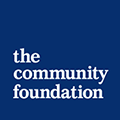questions prospective donors ask

- What services does The Community Foundation provide to donors? The Community Foundation prides itself on providing superior service to its fund donors. Our role is to inform and enrich you and your family’s philanthropy. Donors may be as deeply engaged as they like, or rely upon foundation staff to handle the details. With The Community Foundation, donors may:
- Attend nonprofit agency site visits
- Engage in educational opportunities
- Meet with other philanthropists
- Participate in giving circles
- Involve your family in charitable giving
- How do I start a fund? Setting up a donor-advised, designated or field of interest fund is easy and can be done within 24 hours. You’ll need to select a name for your fund, sign a grant agreement and contribute at least $10,000 to get started (may be given over 3 years). Click here to get started.
- How much does it cost to have a fund? The annualized compensation rate is generally one percent. The minimum annual compensation to The Community Foundation is $100 ($350 for scholarship funds). Fees help pay professional services and sustain our work to build charitable resources for the community. Fees offset costs including the recordkeeping of each fund as well as staff time devoted to investment oversight and grantmaking. Fees are reviewed annually. We may adjust fees as appropriate, at our discretion. This compensation is assessed on a Donor Advised Fund's prior quarter-end balance.
- How much can I give annually from my fund? Up to 4% of the average market value is available annually for distribution. Generally, the spendable income is determined annually based on a rolling 12-quarter market value average.
- Who invests the assets of my fund and how are they invested? The Community Foundation works with advisors in our area where pooled assets are invested. We add any net gains, or deduct any net losses, from the investments to the charitable fund balance on a quarterly basis. As a donor advisor you will receive a quarterly report of your gift and grantmaking history and fund balance which is generally released 4 weeks after the end of each quarter. Fundholders may access fund activity details, gift and grant history, and charitable fund statements online using our secure online service, DonorCentral.
- Can I name my children as advisors to my charitable fund? Yes. At the time the fund is established, you may name one additional generation, usually your children, to serve as successor advisors. These advisory privileges may not be reassigned.
- How do I recommend a grant from the fund? If you establish a donor advised fund, you will identify fund advisors in your fund agreement who are authorized to recommend grants (for example yourself, your spouse, etc.). Fund advisors can log in to the foundation's DonorCentral portal at any time to make a grant recommendation.
- Can I recommend grants to organizations outside of Virginia? Yes. Grantmaking is not limited to Virginia. We recognize that donors have interests that extend beyond our geographic boundary. We will generally approve grants to any qualified 501c3 publicly supported organization in the United States.
- Can I recommend grants to organizations outside of the U.S.? International grantmaking is permitted in accordance with IRS guidelines. The foundation’s preferred way to support foreign-based public charities is through a “friends of” organization that is a U.S. public charity or a U.S. public charity intermediary that does all due diligence and takes responsibility for the grant. If you are uncertain about the legal status of the charity, it is advisable to discuss the details of the potential grant with The Community Foundation before making the recommendation.
- What is the minimum grant size I can recommend? The minimum amount of any one distribution is two hundred and fifty dollars ($250).
- Why do some grants take longer than others for the foundation to pay? Each recommended grantee must submit proper documentation to ensure its public charity status and must be approved by the Board of Governors. Grant recommendations to organizations in the Rappahannock River region area that are frequent grantees will already have documentation on file and generally their grants will be made in the next grant cycle. Those organizations that are new to the foundation require greater research and may take longer to process. We will notify you of any delay in completing your recommendation.
- When should I make my grant recommendations? Grant recommendations may be made anytime throughout the year subject to our due diligence processes.
- Can I make grant recommendations to satisfy personal pledges? No. The IRS strictly prohibits this type of activity. When you are approached by an organization to make a pledge, we suggest that you use the following language to inform them of your recommendation to the foundation:
- “THIS IS NOT A PLEDGE. I will, however, recommend that a grant of $____ be made to your organization from the (name of fund) of The Community of the Rappahannock River Region.”
- If you have any questions regarding the relevance of this rule to a recommendation you are planning to make, please contact us to discuss.
- Can the fund I advise make grants for which I receive benefits, such as tickets to an event, preferred parking or membership benefits? No. Again, the IRS strictly prohibits this type of activity. When you make a gift to The Community Foundation, we provide you with a letter that says “no goods or services were received for your gift.” This statement confirms to your accountant and to the IRS that the full amount of your gift is tax-deductible. Financial penalties apply if you, or a related party, receive more than ‘token benefits.’ The law also bars grants, loans, compensation and similar payments from donor advised funds to donors, advisors and related parties.
- Can I recommend grants to assist an individual in need? No. The Pension Protection Act of 2006 prohibits making grants from donor advised funds, including scholarships, directly to individuals. Grants must always be made to a nonprofit organization or similar entity such as a church or school.
- Do grants have to be made every year? No. Unlike a private foundation, grants do not have to be made every year, nor does a minimum percentage need to be granted. If no grants have been made from a fund for three years, we will collaborate with your chosen fund advisors to be sure the charitable purpose of the fund is accomplished.
- Can I be recognized personally for recommending a grant? Can I remain anonymous? Yes. The letter accompanying a grant check asks the grantee organization to recognize the donor as the ______ Fund of The Community Foundation. You may also remain anonymous if you wish.
- What happens to a charitable fund after all of its advisors have passed? Unless otherwise provided, upon the death of all advisors, all future distributions will be used for The Community Foundation’s unrestricted grantmaking to benefit the community.
- Is fundraising for a donor advised fund permitted? Yes, but we ask you to contact us prior to beginning any fundraising efforts so we can talk about the guidelines and policies. This also ensures we can properly acknowledge gifts received from fundraising activities. Also, it's important you know that fundraising expenses cannot be paid out of a donor advised fund.






